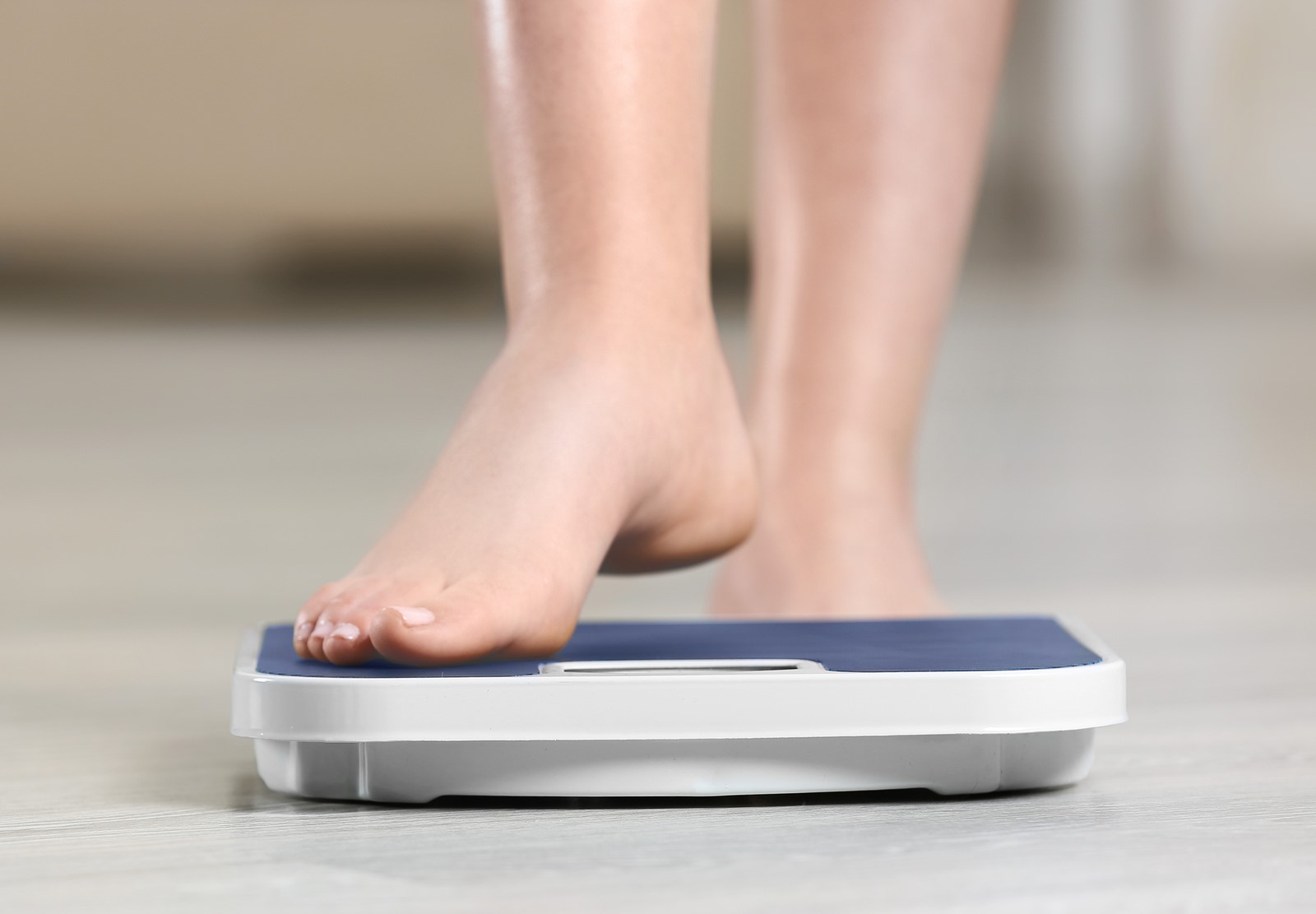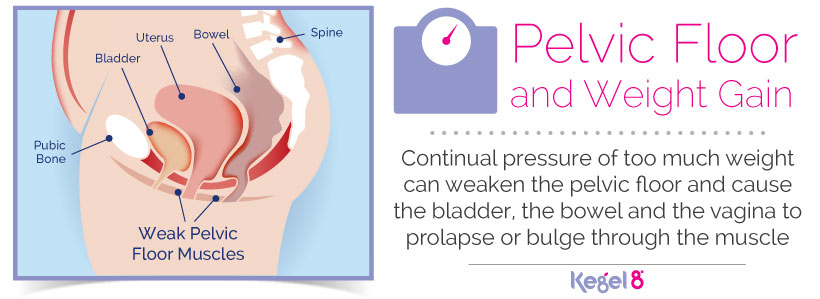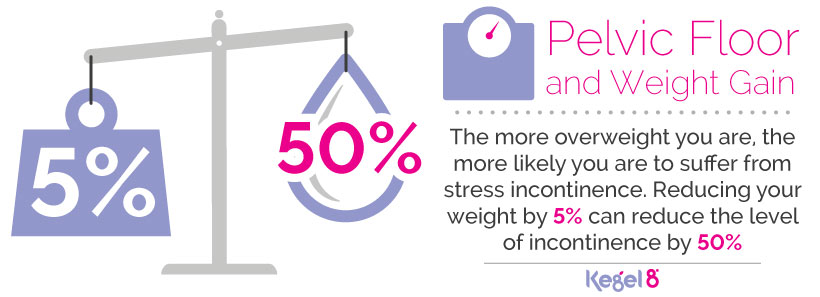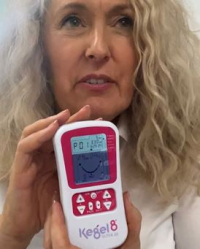
Weight gain during midlife is extremely common. Nearly three-quarters of women aged 60 and over are overweight. But, did you know that one inevitable life event can cause you to pile on the pounds?
The average age most women start menopause is 51. However, 6% of women begin the menopausal process at a significantly earlier age as a result of hysterectomies, cancer treatment, and other medical conditions.
What Causes Weight Gain During Menopause?
As you age, you may find it increasingly difficult to maintain your weight. Around two-thirds of women between the ages of 40 to 59 are overweight, and this can be the fault of that pesky menopause.
A whole host of factors cause weight gain as you grow older, however for women, menopause is one of the leading factors that causes the scales to rise.
How Do Hormones Cause Weight Gain During Menopause?
Around 1 million women use hormone replacement therapy (HRT) when transitioning through the menopause. HRT is a treatment that is used to relieve menopausal symptoms such as:
- Hot flushes
- Mood swings
- Night sweats
- Reduced sex drive
- Vaginal dryness
Most symptoms will pass within a few years, but they can be uncomfortable to endure. Taking HRT can relieve the discomfort of these symptoms, but the medication can cause some nasty side effects, including:
- Breast tenderness
- Headaches
- Indigestion
- Vaginal bleeding
- Nausea
- Abdominal pain
- Heightened risk of developing blood clots and breast cancer.
Oestrogen receptors play a major role in the regulation and distribution of body fat. Menopausal women who undergo HRT tend to have less fat tissue, especially in the stomach area, compared to other postmenopausal women.
When the usage of HRT is stopped, women quickly begin to gain stomach fat. During this process, women store majority of their weight gain as visceral adipose tissue (abdominal fat). This is not the type of fat that you are able to pinch under your skin; instead, this fat is behind the abdominal wall and around some of the vital organs.
During the menopause, visceral fat mass increases by an average of 44%. A complete loss of the oestrogen hormone can cause visceral fat to increase by 10% in just 5 months. Without the presence of oestrogen, your resting metabolic rate decreases by around 50 calories per day, causing a huge disruption in energy balance.
So, over the course of 3 months, this metabolic decrease could add up to a pound of weight gained. Within a year you could have put on almost half a stone! Without reducing your calorie intake or increasing your physical activity, postmenopausal women can naturally gain dozens of pounds over the years through a lowered metabolic rate alone.
Oestrogen promotes body fat accumulation in the lower half of your body, but as women approach menopause, and oestrogen levels begin to decline, you may see a shift towards the apple-shaped body fat distribution.
An apple-shaped body is caused by a build-up of subcutaneous and visceral fat. Subcutaneous fat is not actually unique to the apple shape, but it does tend to make your body appear more flabby. Apple-shaped people also tend to store more subcutaneous fat in and around the torso. A build-up of visceral fat on top of this causes the abdominal muscles to protrude, creating that classic ‘beer belly’ appearance. However, this excess of fat is linked to many health problems that are also associated with obesity. Read on to learn more.
Other Causes of Weight Gain During Menopause
Additional factors that can increase weight gain during menopause are:
- Genetic factors
- Lack of exercise
- Unhealthy eating
- Lack of sleep

What are the Implications of Weight Gain During Menopause?
Menopause weight gain can cause some serious implications for your health. Excess weight can increase the risk of:
- Pelvic floor disorders
- Heart disease
- Type 2 diabetes
- Breathing problems
- Breast, colon, and endometrial cancer
How Does Weight Gain Affect the Pelvic Floor?
As the scales rise, as does your risk of developing a pelvic floor disorder. If you are overweight, you are more likely to develop:
- Incontinence - Your bladder and bowel can become hard to control if you have gained weight. This may result in embarrassing leakage. The more overweight you are, the more likely you are to suffer from stress incontinence. Obesity can also worsen the symptoms of an overactive bladder; you may find yourself going to the toilet more often and during the night and may also suffer some leakage before you reach the toilet.
- Pelvic Organ Prolapse - 1 in 12 women in the UK report symptoms of pelvic organ prolapse. Prolapse is very common in overweight women and gets gradually worse with time. Being overweight means that you carry more excess weight. This extra weight can cause more pressure to be forced upon your pelvic floor and its muscles. This heavy load can weaken these muscles and eventually cause pelvic organs to droop down and bulge through the muscle.
How to Prevent Weight Gain After Menopause?
The scary part of gaining weight during the menopause is that you don’t have to do anything differently to cause the weight influx. You could be eating and exercising the same as you always have, but suddenly you begin to put on weight. It can be difficult to prevent or reverse weight gain during the menopausal process due to the natural decrease in your metabolic rate. Simple weight-control tactics are best used to control weight gain, such as:
- Eating less – To maintain your current weight, you may need to decrease your caloric intake by around 200 calories per day. Choose to eat more fruits, vegetables, and whole grains.
- Moving more – Aerobic exercise can help you maintain a healthy weight. As you gain more muscle, your body can burn calories more efficiently, making it easier to control your weight. Women who lose 10% of their body weight can also reduce their urinary leakage by 50%.
- Limit alcohol intake – These beverages can add excess calories to your diet and increase the risk of weight gain.

To learn more about how weight gain impacts on your health, click here.
For further information about the menopause and its effects, visit Hot Flush to learn more.
Sources:
[1] Antoine, C., Ameye, L., Paesmans, M., Azambuja, E., Rozenberg, S. (2016) Menopausal Hormone Therapy Use in Relation to Breast Cancer Incidence in 11 European Countries. Maturitas. 84, pp. 81-88. Available from https://www.sciencedirect.com/science/article/pii/S0378512215300827
[2] NHS (2016) Hormone Replacement Therapy [online]. NHS [viewed 22/10/2018]. Available from https://www.nhs.uk/conditions/hormone-replacement-therapy-hrt/
[3] Parmet, S. (2016) Why is Visceral Fat Worse Than Subcutaneous Fat? [online]. Science Daily [viewed 22/10/2018]. Available from https://www.sciencedaily.com/releases/2016/04/160425161349.htm
[4] Babaei, P., Dastras, A., Tehrani, B.S., Roudbaneh, S.P. (2017) The Effect of Estrogen Replacement Therapy on Visceral Fat, Serum Glucose, Lipid Profiles and Apelin Level in Ovariectomized Rats. Journal of Menopausal Medicine. 23(3), pp. 182-189. Available from https://www.ncbi.nlm.nih.gov/pmc/articles/PMC5770528/
[5] Kapoor, S. (2016) Manage Menopause Weight Gain [online]. Practo [viewed 22/10/2018]. Available from https://www.practo.com/healthfeed/manage-menopause-weight-gain-5936/post
[6] Franklin, N.C. (2013) What It Means to Have an Apple-Shaped Body [online]. Dr. Nina [viewed 22/10/2018]. Available from http://ninacheriefranklin.com/get-fit/means-apple-shaped-body/
Kozakowski, J., Gietka-Czernel, M., Leszczynska, D., Majos, A. (2017) Obesity in Menopause- Our Negligence or an Unfortunate Inevitability. Menopause Review. 16(2), pp. 61-65. Available from https://www.ncbi.nlm.nih.gov/pmc/articles/PMC5509974/







